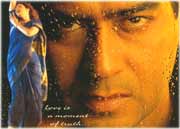|
|
Thakshak |

|
The film starts with the poetic romance between Ishaan and Suman, set against the concrete
Bombay cityscape. Ishaan, the only son of an affluent business family and Sunny, the
grandson of the head of the business house, are being groomed to take over the work. They
share a strong male bonding, Ishaan's controlled & silent strength is an anchor to
Sunny's flamboyant and recklessly violent streak. The business, a construction empire
built by Ishaan's father Nahar Singh and Sunny's grandfather is rooted in violent and
unlawful activities. |

|
|
Ishaan, sheltered in comfort and security, begins to question his environment as his
relationship with Suman, an idealistic young woman, opens up a new world to him. As his
love for her grows, so does his fear of losing her. Ishaan is caught between a life
steeped in violence and his love for Suman who abhors violence.
Torn by his desire to
leave the world of crime, and a sense of loyalty to his father and his friend Sunny,
Ishaan unwillingly gets drawn deeper into violence, and finds himself a participant in an
act of gruesome cold-blooded massacre. The image of a young girl disabled by the violence
haunts his conscience. His quiet but firm resolve to withdraw from the business clashes
with Nahar Singh's pragmatism, to build power at any cost and to legalize crime with that
power, and with Sunny's refusal to realease him from his oath of loyalty.
The events escalate with Ishaan's arrest, and Nahar Singh's murder. Ishaan is finally
forced to make a choice between personal loyalty and a larger allegiance to Society and
Truth.
Thakshak is a story about an individual caught in the eternal moral conflict, a choice
between personal relationships and social responsibility. This conflict is manifest in
Ishaan's character in the film who symbolize the youth of today, caught in a web of
personal relationships, their apathy to social responsibility. He is beckoned to his own
world by the idealistic Suman. Her love gives him the strength to stand for truth, to rise
above the personal and see violence and crime in its true and ugly form.
|
|

